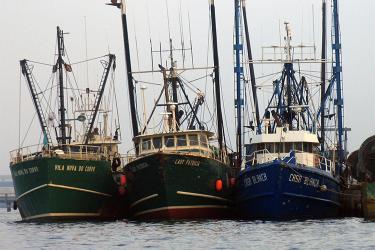April Croxton is a research fishery biologist at the Centers Milford Laboratory and is currently on detail to the NOAA Fisheries Office of Aquaculture. She studies how marine animals and their immune systems respond to environmental stressors such as poor water quality, pollution, and ocean acidification.
1. What got you interested in science?

Growing up, I was a big fan of nature shows that highlighted marine animals and the marine environment. During this time I was fascinated by dolphins, and can admit that I wanted to “save the dolphins” from pollution and other harm caused by humans. My fascination was your typical "because they were pretty". I thought that they were really cool. I love water so anything relating to water was one of my favorite places to be around, or to watch. I am still a big fan of dolphins and other marine organisms because of their ability to serve as models to demonstrate how a changing environment could impact human life. Remember, dolphins are mammals just like us.
2. When did you know you were going to be a scientist?
I have known that I was destined for a career in marine science since the fourth grade. My parents recognized my interests in this field at a very early age and made sure that I was engaged in marine-focused activities throughout my elementary, middle, and high school years. This included being enrolled in math and science programs during the summer months, and even on Saturday mornings. I also had great science teachers and counselors who made sure that my parents were aware of programs to promote my science learning.
3. What accomplishment is your proudest so far?
I am most proud of having the opportunity to share with people the type of exciting work that I do in this field. It is such a rewarding moment when I take my traveling touch tank to events and see the faces of children and adults when I describe that I am doctor for shellfish and that these animals have an immune system similar to ours. Sometimes it’s as simple as informing a child or an adult that shellfish have blood and that I take their blood and look at it just like when we have our blood taken at the doctors. When that person walks away from me, they are now aware of some of the cool things that shellfish can do. It is a great feeling to inspire others to work in this field.
4. What advice would you give young women about a career in science?

“Always remember why you are doing it.” As a young, female African-American scientist, I have faced many challenges within this field, but my passion for marine and coastal science is what drives me every day. Find that passion within and you will be able to overcome any obstacle that you encounter. Secondly, have fun and enjoy the wonderful experiences that you will have during your journey.
To learn more please contact Heather Soulen.


